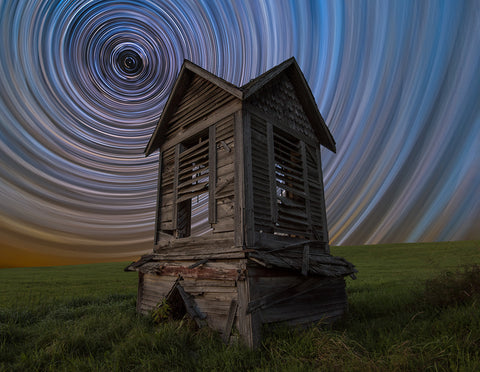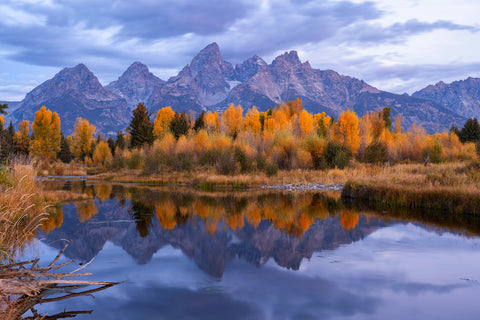"I'm going home," I told the woman sitting next to me on the plane in Billings, Montana, when she asked where I was headed. "Northern Vermont," I added, and then, because I've never been much for conversation, pulled the brim of my hat down and leaned back into my seat as we taxied toward the runway. A Starbucks mocha, loaded to the gills with extra shots of espresso, ensured that sleep was many hours off, but I closed my eyes and thought about it. Where I was going, and what it meant to me.
Easy enough to chalk it up as a trip to view the fall foliage, as pretty as anything in Nature, I figured, but I knew that wasn't entirely it. Maybe that wasn't even part of it. It might be excuse enough to settle my mind some as I hurtled along at 33,000 feet toward Minneapolis, but the real reason was more difficult to understand. I'd spent the past 21 years immersing myself in a life about as unlike any I could have had in Vermont as possible, and yet I'd called it "home" without even thinking when the lady beside me asked my destination.
It sure didn't seem that way in 1995 when I left. Not when the places I'd grown up fishing and hunting were feeling small compared to my desire to see the west. Not when I was certain, as family dairy farms went under on a weekly basis, that the landscape would give way to vacation homes from burgeoning cities on the east coast. Not as the village "characters" -- the man who pedaled duck eggs from a basket on his bicycle, the drifters who slid in and out of town like river mist during haying season to help stack bales in hundred-year-old barns, and the fish monger who hawked glistening, yellow perch -- faded from sight like candles ahead of a 21st Century night. No, it didn't feel like home then. Not when I'd loaded everything I owned into a 1986 Ford Tempo and pointed it toward Montana.
In the Minneapolis airport, among giant, plastic moose leaping out from store fronts, I thought about my years in the west. I'd cut timber, guided hunters, substitute taught in a one-room schoolhouse, boxed for money, helped build houses, published two novels, felt the pull of enormous, sea-run rainbow trout in Idaho, and killed wolves, bears, and mountain lions. I'd lived enough, seen enough, and done enough to make it home and yet, as I was herded onto the next plane on my trip east, it didn't exactly feel as though I'd succeeded.
I had a pair of seats to myself this time, enough room to nearly stretch out, and enough time between the western edge of the Great Lakes and eastern edge of New York City's Laguardia, to chew it over. But, moving away from the sun at 8 miles a minute, my mind was as jumbled as the rough air we bounced through between day and night, unwilling to yield any answers.
In times of indecision, a man is served well by going north. I've known it since I was a boy and looked into the teeth of a Canadian-born wind, breathing black spruce taiga air, feeling that 360 degrees on the compass pointed to more truth than just true north. I can't explain why, but feeling it has been enough, and as my Canadair Regional jet pulled skyward in that direction out of New York, I felt closer to some answers than I had all day.
Fifty minutes later the wheels contacted pavement in Burlington, Vermont, and two hours after that, in the hulking shadow of the mountain where I'd killed my first deer as a young man, I stood in front of the midnight silhouette of the house I'd grown up in. In the bed in my old room, largely unchanged in two decades, sleep was slow to come, and when it did my dreams flowed between things I'd done in Vermont and also Montana, weaving events and places together as only dreams can do, leaving me at least as tired when I woke as I was when I lay down.
The world outside was cloaked in fog - a breathing, flowing thing - as though autumn had tried on a misty coat to walk this morning among the living. I took my camera and without thinking pointed my mother's car north, stopping on the edge of Irasburg to watch still-standing corn against a veiled sun.

I could hear a cacophony of birds, not their exuberant spring song but calls of anxious anticipation. Everyone talking at once about their impending southward journey. High above, a string of geese was already taking advantage of the day's first wind, faint voices drifting through the rattle of dry corn stalks. I saluted them and drove off in the opposite direction, refusing to change course no matter what they told of the coming winter.
I stopped next in a high meadow whose field edge is in constant struggle between the mower and the woods. A strip of meadowsweet and gone-by golden rod - a demilitarized zone of sorts between timothy and grey birch - was speckled with bright, red clover, Vermont's state flower. Full of dew, droplets clinging to petals like some primal DNA strand, I took picture after picture, waiting for the sun to bathe it in just the right light to show in camera what I imagined in my mind. By the time I finished, more or less satisfied, the fog of early morning was gone, leaving views of the distant White Mountains of New Hampshire unobstructed save by the haze of autumn.
A million memories between me and them, I thought. Tanin-stained bog brooks and hardwood ridges. The curl of steam from a sugarhouse in March and the steeple-straight wraith of smoke from a wood stove on a below-zero, winter night. The muffled rush of a grouse's wings and the steady tug of a large brook trout. The crack of a well-hit baseball sailing over a brown-grass infield below steely, April clouds. The smell of a horse barn during a county fair and the thump of tires negotiating roads shattered by frost heaves. Mud and more mud and the scent of fresh-cut hay. Sometimes the wail of a village volunteer fire department's siren when the hay was baled too wet and a barn was burning. I surveyed the day, my mind spinning back through time, then blinked hard and focused on a yellow sulfur butterfly hovering over orange hawkweed.
I've made nearly as many memories in Montana I thought as I watched it, so why do they feel so different here? Why do they reach deeper into my soul?
Back on the road, I was forced by the approaching Canadian line to break off my northward course. So be it, I thought, swinging east toward the wildest part of Vermont, paper company land turned national wildlife refuge. It was here where my father and I had often come to fish for brook trout in icy streams whose banks might go a full year between sets of boot prints. I stopped once to take a picture of an especially colorful maple tree, the glacial cut of Willoughby Lake in the background, then drove straight to the Wenlock Woods, as close to Montana's wilderness as New England can offer up.

I walked along a gated logging road, its humped center thick with caribou moss, smelling the fall woods, an aroma uniquely their own. A few days of showers had given rise to myriad mushrooms of every shape and color, forcing their way toward sunlight. I've heard that their DNA is closer to our own than to most other plants, and was careful not to disturb this orange fellow basking near a fallen maple leaf while I took his picture.
As the sun warmed the woods, I left them, driving north again, pulled subconsciously toward the farm house I spent the first four years of my life in. It was there I'd imprinted Vermont on my heart in much the same way a salmon fry marks the pool it's born in. And in much the same way it returns, so was I. I wondered, driving next to spruce bogs ringed with brilliant red maples, if I had any more choice in the matter than the salmon? Perhaps that was it. Perhaps I didn't. Perhaps I was subservient to a gravity centered in a place which, despite living elsewhere, will always be home. Worst places for sure, I thought, stopping in the middle of the road to photograph a glowing sugar maple.

The distances in Vermont are nothing like the breadth of Montana, and in half an hour I found myself parked just down from the house my parents lived in when I was born. I sat in a neighbor's driveway, their house now abandoned, rusting chains which had hung whitetail bucks from front-yard poplar trees remaining like epitaphs to men long gone. I'd loved these men and as I sat, staring at moss consuming the roof's shingles, I remembered sleeping on their couch one February night before they took me ice fishing for Willoughby's lake trout. Certain I would never sleep, I'd somehow drifted off, waking one wall away from where I sat now to Alabama's song, Roll On Eighteen Wheeler, playing on a clock radio. We'd caught lake trout that morning and I'd drank black coffee laced with a bottlecapful of strong whiskey. It was an apprenticeship to becoming a man, one that had stood me in good stead 20 years later and 2,300 miles to the west.
A mile down the road was the brook I'd caught my first trout in - flipping four inches of pale, April brookie onto a bank of stubborn snow from the backpack my father carried me in before I was three. Driving over the culvert where it trickled under the road, I remembered burying my face into my dad's wool coat on the walk home, shielding it from the wind. It could have been yesterday, I thought, jogging west onto a dirt road that led past the baseball field where I'd helped turn a triple play once during a T-ball game, another memory so vivid that the years between seemed moments.
I was looping, as subconsciously as I'd driven to my first home, back around toward Irasburg, the village I'd lived in most of my life in Vermont, but I wanted to walk again and this time picked a mountain I hadn't set foot on for 25 years. I'd climb it in the afternoon, taking a little longer to think about the years between. A little longer to think about why, even having been gone so far so long it still seems like home.

I've loved Montana, I thought as I started up the granite mountain, picking my way around boulders dropped by the last glacier as it, wisely I think, headed north. I've made great friends and seen wonderful things. I've spent nights in a ranch house where my sheets froze to the wall. I've stood on the shoreline of lakes 10,000 feet high and watched stars spin overhead through air so clear they appear close enough to touch. I've tried to capture some of its beauty in my photography. In my writing. In my mind. I've made a home, but it hasn't necessarily been home.
I could have walked faster up the mountain. Hell, after years of climbing steeper, taller peaks in Montana I probably could have run up it, but to do so seemed somehow disrespectful. I took my time, picking my way along, wondering if there would ever be another place on Earth where my soul feels as content as it does in the Northeast Kingdom - that triangle of country between the Green Mountains, the Canadian border, and New Hampshire.
Deep in thought, deep in the shade of a forest full of leaves, I hadn't noticed the day cloud completely over until, as I broke out on a series of cliffs, the sun found it's way through and lit the mountain before me, Vermont's hardwood trees glowing as though they possessed the light themselves.

A little further took me to another overlook where I sat for a long time, staring out over Willoughby Lake. Somewhere in its depth were the descendants of the lake trout I'd caught that winter morning long ago. I could picture them, suspended in the cold, dark water, large eyes searching for the shimmer of minnows and their next meal. Like the stars on clear, Montana nights, they seemed within arms reach. They swam in front of me until the afternoon breeze grew chilly and I stood and began my trek down off this mountain.
It was early evening by the time I wound my way back to Irasburg, and I parked on the common - the green in the center of the village where my father and I had played baseball on a thousand summer nights. The field didn't appear used much now, and like some of the abandoned homes I'd seen earlier in the day it made me sad. Where were the boys playing whiffleball against the backstop until it was too dark to see?
I stood there until the light dimmed and my stomach said it had been hours since my last meal. I'd asked my sister recently if Nashville, where she lived with her husband and two children, felt like home to her. She'd answered right away in the affirmative, and I was happy for her. Perhaps having a family grounded her in place in a way I hadn't experienced.
As a star appeared over Irasburg Mountain, directly above where I'd shot my first deer, I thought that in two weeks time I'd be hunting elk in Montana. And loving it. The cold, high-mountain air, the musk of those large, antlered animals, the burn in my legs from fighting for purchase on steep slopes. Then I'll look forward to winter and trips to the edge of Yellowstone Park to look for photos of big horn sheep and frigid, pink sunrises. And then that will blend to spring and heavy, rainbow trout pulled from headwaters of the Missouri.
It all spins forward so damn fast, I thought, pulling into the driveway where I'd begun my trip 10 hours earlier. My time in Vermont would go by as fast as any of it I knew, and it did. And to be honest, apart from realizing that corner of the world has some innate grip on my heart, I never fully could answer to myself why it stills feels more like home than anywhere else I've been. Maybe that's just the way it is for some of us. We spread our wings and fill our lives with all that draws us at the moment, searching always for another ridge to peer over.
I'm not sure how long a man's heart can remain divided, whether it be between loves.... careers.... places. Perhaps someday, on the back side of a distant ridge, I'll look down on both where I live and where I call home.
The following Vermont pictures (and many more), pictures of my home, will be for sale soon here.












MIchelle. (WEBSTER) Harris
I’ve enjoyed reading your blogs and browsing through your photography. You brought back many great childhood memories growing up in the NE Kingdom. Although change is inevitable, it’s a part of life. Hope all is well with you,
Michelle (WEBSTER) Harris